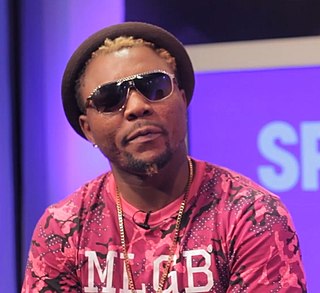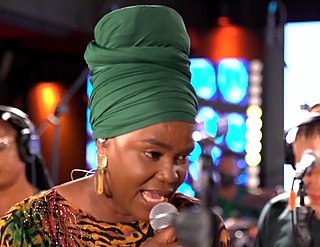Related Research Articles
Though reggae music first developed in Jamaica, it has strong rhythmic and thematic associations with Africa and has been called "the quintessential African/third world/black musical form". There are many African reggae musicians with a wide fan base both on the continent and abroad. Well-known African reggae artists are Alpha Blondy, Pax Nindi aka Harare Dread, Majek Fashek, Tiken Jah Fakoly, Colbert Mukwevho,Thomani Tshikororo, Ismael Isaac, Radical Dread, Jambo, Soul Raiders, Lucky Dube, and Serges Kassy.
Ajegunle, popularly known as "AJ City" or simply "AJ", is a neighbourhood located in the heart of Lagos, Lagos State, Nigeria. It is located in the Ajeromi-Ifelodun local government area of Lagos. Ajegunle in the Yoruba language means "A place where riches dwells."

Innocent Ujah Idibia MON, known by his stage name 2Baba and formerly as 2face Idibia, is a Nigerian singer-songwriter, record producer and philanthropist known for his solo debut album, Face 2 Face. He is regarded as the "most influential" in the Nigerian music industry following his contributions to Nigerian pop music in the 2000s.

Isoko South is a local government area (LGA) in the Isoko region of Delta State, Nigeria. With its headquarters at Oleh, Nigeria, it is one of the two local governments that make up the Isoko region. The other is Isoko North, which has its headquarters at Ozoro.

Isoko people are an ethnolinguistic group who inhabit the Isoko region of Delta State and Bayelsa State, Nigeria. They are people of southern Nigeria, near the northwestern Niger delta. Delta State and Bayelsa State are part of the 36 states of the Federal Republic of Nigeria.

Sound Sultan was a Nigerian rapper, singer, songwriter, actor, comedian, and recording artist. He was regarded as one of the pacesetters of modern hip hop music in Nigeria. He was notable for using his music to speak against poverty, corruption, bad governance and societal ills in Nigeria.
The Headies 2012 was the 7th edition of The Headies. It was hosted by M.I and Omawumi. The ceremony took place on 20 October 2012, at the Eko Hotel and Suites in Victoria Island, Lagos. The aforementioned hosts thrilled fans with their song titled "The Headies". Chidinma opened the show by performing her song "Kedike". The Okoye brothers won a total of three awards. The Artiste of the Year award went to Wizkid. Tiwa Savage and Wande Coal won the Best Male and Female Vocal Performance categories, respectively. Vector won the Best Rap Single and Lyricist on the Roll plaques for "Angeli". Davido won the Next Rated category and was later awarded a Hyundai Sonata. The Headies celebrated the reunion of prominent Nigerian musicians from the 80s and 90s, including Onyeka Onwenu, Oris Wiliki, Mike Okori, Baba Fryo, Shina Peters, Fatai Rolling Dollar and Daddy Showkey. Femi Kuti was honored with the Hall of Fame award.
Daddy Showkey is a veteran Nigerian galala singer. His genre of music is called ghetto dance or simply ghetto. He was popular in Ajegunle in the late 1990s. He was born as John Odafe Asiemo but is known as Daddy Showkey all over the Ghetto. He hails from Olomoro Kingdom in Isoko South LGA of Delta State.

Oritsefemi Majemite Ekele popularly known by his first name Oritse Femi, is a Nigerian singer-songwriter and performer. He is best known for his remake of Fela Kuti's "Double Wahala" song. His rendition of the song earned him two nominations at the 2014 City People Entertainment Awards, winning the award for Most Popular Song of the Year. He also won the Indigenous Artist of the Year award at the 2014 Nigeria Entertainment Awards. In 2014, he released the remix for his version of the song featuring D'banj.

Lara George, known professionally as a US-based Nigerian gospel singer, songwriter and producer. She started her music career at the University of Lagos and was a member of the disbanded musical group Kush. Her debut album Forever In My Heart was released in 2008 and included the hit single "Ijoba Orun," which earned her several awards and nominations. She has performed at notable events and appeared on BET International as one of the first Nigerian artists to be aired on that show. She is married with two children and lives in Alpharetta, Georgia in the United States. Additionally, she is the Vice President of SoForte Entertainment Distribution Ltd., the first home-grown structured entertainment distribution company in Nigeria.
Oluwatobiloba Daniel Anidugbe, who is better known as Kizz Daniel, is a Nigerian singer and songwriter. He rose to fame in 2014 with his debut single, "Woju". He signed a record deal with G-Worldwide Entertainment in 2013, but left the label following a publicized contract dispute and court case. He founded the Fly Boy Inc record label in November 2017.

Babatunde Okungbowa, popularly known by his stage name OJB Jezreel or OJB, was a Nigerian singer, songwriter and record producer. He died on June 14, 2016, of kidney disease.

Sola Allyson-Obaniyi, popularly known as Shola Allyson or Sola Allyson(born on 24 September 1971), is a Nigerian soul, folk, and gospel singer and songwriter. She came into limelight with the hit album Eji Owuro (2003), which was the soundtrack album for a film of the same title. After Eji Owuro, she released other albums like Gbeje F'ori, Ire and Im'oore amongst others. Her popular songs include: "Eji Owuro", "Obinrin Ni Mi", "Aseye", "Isinmi", amongst others. Apart from being a singer, she is also a voice coach, counsellor and a consultant. She also makes music covers for Nigerian movies.

Sodiq Abubakar Yusuf, popularly known by his stage name CDQ, is a Nigerian indigenous rapper, singer and songwriter best known for his single "Nowo E Soke" featuring Wizkid and Masterkraft's Indomie where he was featured alongside Olamide. While the former is instrumental for launching his career into the Nigerian music industry, the later won him his first career award at the 2016 Nigerian Music Video Awards. Signed to his label No Struggle No Success Entertainment, CDQ's repertoire of music includes rapping in Yoruba language with addition of ad-libs such as the popular "Woss Wobi" which he invented.
Daddy Fresh is a veteran Nigerian reggae singer from Abia state and was born in Lagos state Nigeria, Daddy Fresh started his musical career professionally in the mid-1980s. He was the founding member, leader, lead vocalist, and songwriter, of the group “DE Pretty Busy Boys” which comprises Daddy Showkey Cashman Davies and Sexy Pretty. He became famous in the late 1990s all over Nigeria. During this time, he was honored as the "King of the Ajegunle Musicians" for his innovation of a music genre known as galala or ghetto music. Ghetto music's development was not entirely his own, as it was also influenced by the work of Daddy Showkey and Baba Fryo.

Miracle Kelechi Chike popularly known as Miraboi is a Nigerian businessman and talent manger. His parents are from Abia State, Bende local government area in Nigeria but he was born and brought up in Lagos State, Ojo local government, Nigeria where he also started his early life career.
NEC Live is Nigerian Entertainment Conference (NEC) with a hashtag (#Live) and often written as NECLive. It is an annual deliberative conference of Nigerian entertainers.

Mabel Akomu Oboh, popularly known as Mabel Oboh is a Nigerian broadcaster, actress, film producer and founder Mabeloboh Center For Save Our Stars (MOCSOS). She is the first television film independent producer/director and the second female soap opera producer in Nigeria with her drama series titled Victims that later became a network productions in the '80s on Nigerian Television Authority.

Dare Fasasi, known professionally as Baba Dee, is a Swedish-Nigerian movie director, and dancehall artiste. He was the older brother of Nigerian singer-songwriter, Sound Sultan, with whom he founded a record label named Naija Ninja Entertainment Production Company. Baba Dee's music career began with the release of his debut album in 1997.

John Oboh also known as Mighty Mouse, was a Nigerian music Producer, composer and musician. He pioneered the AJegunle music beat, a Nigerian music genre that combines Edo Nigeria Esan samba, raggea and West African music with jazz. He was awarded by the Nigerian Books of Record.
References
- ↑ Michael, Chijekwu (3 October 2020). "I need help Baba Fryo cries out" . Retrieved October 3, 2020.
- ↑ Anokam, Sam (27 September 2013). "My frustration as a musician - Baba Fryo - Vanguard News".
- ↑ Osaremen Ehi, James (August 23, 2012). "Popular 'Ghetto' Singer, Baba Fryo Gang Beaten By Police". Archived from the original on 2016-04-01. Retrieved 2014-09-18.
- ↑ Adeniji, Gbenga. "Little Love not enough for Baba Fryo". Archived from the original on August 2, 2014.
- ↑ "BABA FRYO LAMENTS!'I wish I married a wife in the showbiz business'". Vanguard News. 2017-08-25. Retrieved 2021-03-04.